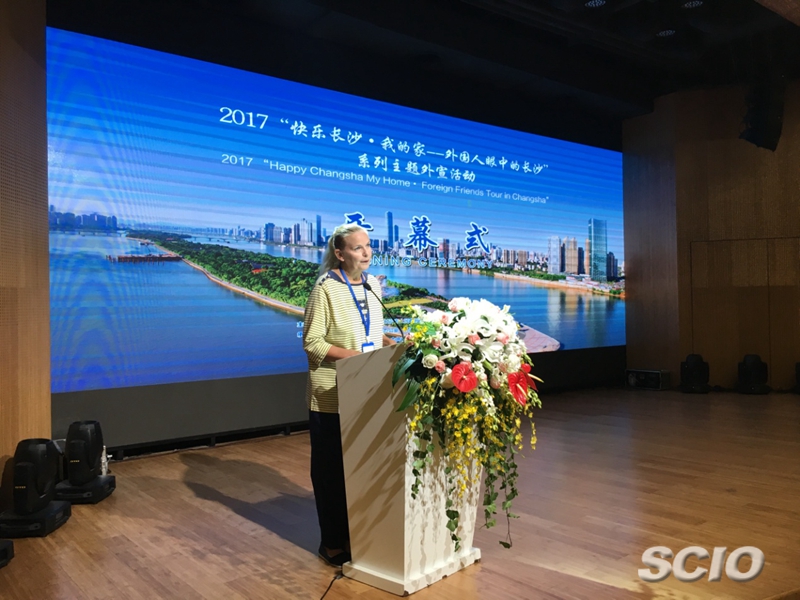Changsha attracts foreigners with culture and technology
By Cui Can
A two-day tour for foreign visitors in Changsha, Hunan Province, kicked off on Oct. 28. With the tour, the city aimed to present its new image and share its history and development to the world through culture and art.
Bonnie Krcmar, a professor at the National University of Defense Technology, speaks at the opening ceremony of the tour held in Changsha, Hunan Province on Oct. 28, 2017. [Photo by Cui Can/China SCIO] |
Entitled "Happy Changsha, My Home," the tour received more than 50 foreigners from 24 countries working or studying in Changsha. The host city took the visitors to the Li Zijian Art Museum, the Tanheli Bronze Culture Museum, Changsha’s high-tech zone and the cultural show of the Tanhe Ancient City.
"Changsha is a place to relax and experience China’s life at reasonable costs in a city full of friendly, welcoming citizens," Bonnie Krcmar, a professor at the National University of Defense Technology, said at the tour’s opening ceremony. "Each time I leave Changsha for a few months and then return, I am eager to scope out the latest changes, as this city is building and renovating rapidly."
With the city’s rapid building and renovating, Changsha is striving for further development and opening up to the world. According to the local government, Changsha's industrial economic output grew to 1.16 trillion yuan (US$174.9 billion) in 2016, ranking fourth among provincial capital cities in China. At present, there are 15 Hunan-based enterprises recording foreign trade of more than US$100 million, four of which are located in the Changsha Economic and Development Zone.
With a long history and rich cultural resources as well as its location in the Yangtze River Economic Belt, the city appeals to many foreign talents with its preferential policies for promoting entrepreneurship and innovation.
Michael Donovan, a chief engineer who works in a biotechnology company in Changsha, is one of the foreign talents attracted by the city’s unique charm and decided to study and work there. He said that he enjoyed living here, and had already seen Changsha as his second home.
"This is my sixth year in Changsha," Donovan said. "Originally, my plan was to be here for only two years to complete my master's and then return to the U.S., but I was quite interested in the culture and history of Changsha, and also the rapid growth of bio-technology here."
Donovan said Changsha had implemented a batch of preferential policies to boost the development of hi-tech industries, especially bio-technology, which is still a relative new industry in China. He said this is attracting a number of talented minds both at home and from abroad to the city. For example, there is a new bio-tech center in Hunan University run by top-level professors from the U.S. and Germany in this field.
In addition to the rapid development in emerging industries, Changsha also attaches great importance to preserving and promoting its culture.
"One of the things that Changsha impresses me most is that almost every museum and art center is open to the public,” said Zhur Alena, a 27-year-old from Ukraine who is studying for her doctorate at Central South University. “In the past year, the beautiful cultural center at North Star Delta opened, where I have enjoyed several concerts, quiet coffee in the library, and learned so much about Changsha in the Demonstration Hall and Museum."
As Krcmar said in her opening remarks, "when relaxing and appreciating the culture of Changsha, it’s not easy to forget that we are also in a fast-growing technological, entrepreneurial and industrial city." The city tries to blend its historical culture and rapid industrial development to attract foreigners to live and work there.
